The Five Heroines
Adah
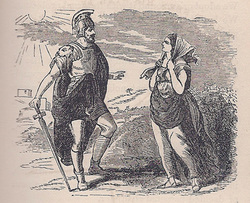
Adah, the Daughter of Jephthah (Judges Chapter 11)
While Jephthah was in Tob, the Hebrew people began to seek a strong leader of men who would save their nation from the destruction planned by the Ammonites. By this time, the enemy forces had been marshaled together and were ready to march against the Israelites. The Elders of Gilead had let it be known that the command of their forces was open to any man who could accept. No one having come forward, the elders approached Jephthah and asked him to assume the command.
Jephthah was deeply anxious to be victorious, but he had serious misgivings about his ability to handle this Herculean task without some Divine Assistance. At this point, the Spirit of the Lord came to Jephthah, and Jephthah told the Lord that, if he were victorious over the enemy, and if he were returned home safely, he would sacrifice to the Lord whatsoever came out of his house first. Having communed with God, Jephthah started forth to do battle against the enemy.
There was an hour of great triumph for Jephthah. In his heart he was deeply thankful to God for His Help, and he was overcome with joy as he once again saw the beloved lands of his home. Then, bounding out of the house came his beloved Adah! In this instant, the joy of victory, the happiness of his homecoming, and all of the supreme exultation of his triumph vanished. For, as Jephthah looked at the gay, shining face of his young daughter, he remembered that according to the terms of the vow which he had made of his own free will and volition, he had committed his one and only child to death.
The problems which faced Adah may also be simply stated. Adah had been included in a vow to God which was in accordance to the law of the times. Legally, and morally, Jephthah was free to make any and all decisions for Adah until such time as she married. Adah could dispute neither the wisdom nor the authority of Jephthah’s decision. Adah, also, had no choice but to keep faithful to her father and to her God.
There is another most important aspect present in both Adah’s and Jephthah’s situations. This is the willingness with which both of them fulfilled their obligations. It was not necessary for God to send His messengers to force Jephthah to keep faithful to his vow. Jephthah did not force God into loosing the fury of His wrath upon him. He voluntarily kept faith even under the stress of great personal anguish. It was not necessary for Jephthah to drag Adah from a hiding place. It was not necessary for Jephthah to bind and tie her in order to fulfill the agreement. When the time came, Adah came forth, willingly and unafraid, to keep faith even at the cost of life itself. Adah met death at her father’s hand according to the biblical story.
While Jephthah was in Tob, the Hebrew people began to seek a strong leader of men who would save their nation from the destruction planned by the Ammonites. By this time, the enemy forces had been marshaled together and were ready to march against the Israelites. The Elders of Gilead had let it be known that the command of their forces was open to any man who could accept. No one having come forward, the elders approached Jephthah and asked him to assume the command.
Jephthah was deeply anxious to be victorious, but he had serious misgivings about his ability to handle this Herculean task without some Divine Assistance. At this point, the Spirit of the Lord came to Jephthah, and Jephthah told the Lord that, if he were victorious over the enemy, and if he were returned home safely, he would sacrifice to the Lord whatsoever came out of his house first. Having communed with God, Jephthah started forth to do battle against the enemy.
There was an hour of great triumph for Jephthah. In his heart he was deeply thankful to God for His Help, and he was overcome with joy as he once again saw the beloved lands of his home. Then, bounding out of the house came his beloved Adah! In this instant, the joy of victory, the happiness of his homecoming, and all of the supreme exultation of his triumph vanished. For, as Jephthah looked at the gay, shining face of his young daughter, he remembered that according to the terms of the vow which he had made of his own free will and volition, he had committed his one and only child to death.
The problems which faced Adah may also be simply stated. Adah had been included in a vow to God which was in accordance to the law of the times. Legally, and morally, Jephthah was free to make any and all decisions for Adah until such time as she married. Adah could dispute neither the wisdom nor the authority of Jephthah’s decision. Adah, also, had no choice but to keep faithful to her father and to her God.
There is another most important aspect present in both Adah’s and Jephthah’s situations. This is the willingness with which both of them fulfilled their obligations. It was not necessary for God to send His messengers to force Jephthah to keep faithful to his vow. Jephthah did not force God into loosing the fury of His wrath upon him. He voluntarily kept faith even under the stress of great personal anguish. It was not necessary for Jephthah to drag Adah from a hiding place. It was not necessary for Jephthah to bind and tie her in order to fulfill the agreement. When the time came, Adah came forth, willingly and unafraid, to keep faith even at the cost of life itself. Adah met death at her father’s hand according to the biblical story.
Ruth
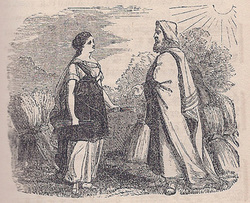
Ruth, the Widow of Mahlon, Wife of Boaz (Ruth 1:16, 2:5-6)
The story of Naomi, Ruth, & Boaz is one of the gems of sacred literature - so beautiful that it is not surpassed in any writings of fiction or fact. The incidents of the story are among the most fascinating of the entire Bible, marked with poetic beauty and simplicity. The climax is reached in the romance and marriage between Ruth and Boaz. But the events of some years prior must be read for one to fully appreciate this beautiful and happy climax.
Ruth the heroine of the story, was a lovely maiden of Moab, while Boaz was a nobleman and wealthy citizen of Israel. The Moabites were aliens to the Israelites, idolaters, and intermixture of the two races was forbidden by Jewish law. Mutual enmities existed between the two races.
For economic reasons Naomi, her husband Elimelech, and their two sons had migrated to the land of Moab from the little Hebrew town of Bethlehem. Some of the Moabite people were wholesomely influenced by the piety, devoutness and religious strictness of this family. Ruth became the wife of one of the sons, and quite evidently a proselyte to the Hebrew religion. Tragedy came to this Hebrew family in a strange land. Elimelech and the two sons died , and three lonely widows were left desolate. When Naomi decided to return to Israel and to her native town of Bethlehem, Ruth refused to sever her attachment to Naomi and accompanied her. The depth of her love for her mother-in- law and her devotion to the Hebrew religion were given expression in these immortal words:
Entreat me not to leave thee,
Or to return from following after thee:
For whither thou goest, I will go;
And where thou lodgest, I will lodge;
Thy people shall be my people,
And thy God my God:
Where thou diest, I will die,
And there will I be buried:
The Lord do so to me, and more also,
If ought but death part thee and me.
In providing for the material needs of herself and her mother-in-law Ruth followed a law and well established custom in Israel which provided the privilege of gathering fragments of grain behind the reapers at harvest time. This was a humiliating and arduous form of employment followed only by the very poor and needy. The nobility, industrious disposition, and frugality of Ruth were impressively manifest in this menial engagement.
Through the strange workings of divine providence it happened that Ruth was gleaning scattered grain in the wheat fields of the nobleman Boaz, a distant relative of her deceased husband. While making his usual rounds of observation among his reapers, Boaz was attracted to this young woman, and inquired about her identity and sought other information about her. He made himself known to her as the owner of the farm and extended unusual courtesies and favors to her. He invited her to have lunch with him, and the acquaintance soon blossomed into an enchanting romance. Genuine love for each other throbbed in the hearts of both. According to the customs in Israel under the circumstances in which both Ruth and Boaz related, Ruth must take the lead in presenting her claims for marriage, This she did with timidity and modesty under the guidance of her mother-in-law Naomi and in accordance with the customs of Israel. The love and esteem which Ruth manifested for Boaz were fully reciprocated, and the nobility of his character shined in superb brilliance and glory. He took the necessary legal steps to remove all the barriers to marriage between himself and Ruth, and she soon became his bride. There was born to them a son whom they named Obed who was later the father of Jesse who was the father of David. Boaz and Ruth became the ancestors of a long line of kings who ruled over Israel and Judah, and of the Messiah-Savior.
The story of Naomi, Ruth, & Boaz is one of the gems of sacred literature - so beautiful that it is not surpassed in any writings of fiction or fact. The incidents of the story are among the most fascinating of the entire Bible, marked with poetic beauty and simplicity. The climax is reached in the romance and marriage between Ruth and Boaz. But the events of some years prior must be read for one to fully appreciate this beautiful and happy climax.
Ruth the heroine of the story, was a lovely maiden of Moab, while Boaz was a nobleman and wealthy citizen of Israel. The Moabites were aliens to the Israelites, idolaters, and intermixture of the two races was forbidden by Jewish law. Mutual enmities existed between the two races.
For economic reasons Naomi, her husband Elimelech, and their two sons had migrated to the land of Moab from the little Hebrew town of Bethlehem. Some of the Moabite people were wholesomely influenced by the piety, devoutness and religious strictness of this family. Ruth became the wife of one of the sons, and quite evidently a proselyte to the Hebrew religion. Tragedy came to this Hebrew family in a strange land. Elimelech and the two sons died , and three lonely widows were left desolate. When Naomi decided to return to Israel and to her native town of Bethlehem, Ruth refused to sever her attachment to Naomi and accompanied her. The depth of her love for her mother-in- law and her devotion to the Hebrew religion were given expression in these immortal words:
Entreat me not to leave thee,
Or to return from following after thee:
For whither thou goest, I will go;
And where thou lodgest, I will lodge;
Thy people shall be my people,
And thy God my God:
Where thou diest, I will die,
And there will I be buried:
The Lord do so to me, and more also,
If ought but death part thee and me.
In providing for the material needs of herself and her mother-in-law Ruth followed a law and well established custom in Israel which provided the privilege of gathering fragments of grain behind the reapers at harvest time. This was a humiliating and arduous form of employment followed only by the very poor and needy. The nobility, industrious disposition, and frugality of Ruth were impressively manifest in this menial engagement.
Through the strange workings of divine providence it happened that Ruth was gleaning scattered grain in the wheat fields of the nobleman Boaz, a distant relative of her deceased husband. While making his usual rounds of observation among his reapers, Boaz was attracted to this young woman, and inquired about her identity and sought other information about her. He made himself known to her as the owner of the farm and extended unusual courtesies and favors to her. He invited her to have lunch with him, and the acquaintance soon blossomed into an enchanting romance. Genuine love for each other throbbed in the hearts of both. According to the customs in Israel under the circumstances in which both Ruth and Boaz related, Ruth must take the lead in presenting her claims for marriage, This she did with timidity and modesty under the guidance of her mother-in-law Naomi and in accordance with the customs of Israel. The love and esteem which Ruth manifested for Boaz were fully reciprocated, and the nobility of his character shined in superb brilliance and glory. He took the necessary legal steps to remove all the barriers to marriage between himself and Ruth, and she soon became his bride. There was born to them a son whom they named Obed who was later the father of Jesse who was the father of David. Boaz and Ruth became the ancestors of a long line of kings who ruled over Israel and Judah, and of the Messiah-Savior.
Esther
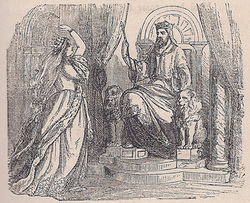
Esther, Wife of Xerxes (Esther 2:17, 4:11, 5:1-3)
The daughter of Abihail was named Hadassah which means "Myrtle".
She, with her guardian Mordecai, lived within the kingdom of Ahasuerus (Xerxes) and her Decendency from the Jewish race was kept secret.
She had been given the name "Esther" (meaning "star") as Another means of hiding her ancestry.
Mordecai was made Hebrew minister to the King, a position of great importance.
Queen Vashti refused to come before the drunken King Xerxes and his court, causing him to divorce and expel her from the court. Xerxes’ princes suggested a search throughout the kingdom for the loveliest of young maidens to be made queen.
Esther was chosen and became queen in 473 B.C.
Haman, the king’s prime minister, sent forth a decree that on a given day all Jews throughout the kingdom would be slaughtered.
Mordecai pleaded with Esther to intercede on behalf of her people which, after some hesitation, she did. the king accepted Esther’s plea and caused the power-hungry Haman to be hanged on the same gallows he had ordered built for Mordecai.
The date the Jews were saved from extinction is celebrated today as the feast of Purim or the feast of lot on the 14th and 15th of Adar. Queen Esther is greatly esteemed by Jews the world over for her bravery and sacrifice.
The daughter of Abihail was named Hadassah which means "Myrtle".
She, with her guardian Mordecai, lived within the kingdom of Ahasuerus (Xerxes) and her Decendency from the Jewish race was kept secret.
She had been given the name "Esther" (meaning "star") as Another means of hiding her ancestry.
Mordecai was made Hebrew minister to the King, a position of great importance.
Queen Vashti refused to come before the drunken King Xerxes and his court, causing him to divorce and expel her from the court. Xerxes’ princes suggested a search throughout the kingdom for the loveliest of young maidens to be made queen.
Esther was chosen and became queen in 473 B.C.
Haman, the king’s prime minister, sent forth a decree that on a given day all Jews throughout the kingdom would be slaughtered.
Mordecai pleaded with Esther to intercede on behalf of her people which, after some hesitation, she did. the king accepted Esther’s plea and caused the power-hungry Haman to be hanged on the same gallows he had ordered built for Mordecai.
The date the Jews were saved from extinction is celebrated today as the feast of Purim or the feast of lot on the 14th and 15th of Adar. Queen Esther is greatly esteemed by Jews the world over for her bravery and sacrifice.
Martha
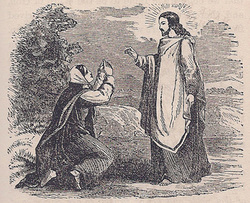
Martha, the Sister of Lazarus (John 11: 1, 21-26)
Her brother, Lazarus, was a resident of Bethany, a man of good standing among his fellow-citizens, and the friend of Jesus Christ.
The family, composed of two sisters, Martha and Mary, with their brother Lazarus, seem to have possessed all things needful for a happy life.
Bound up in the love of each other, and blessed with the friendship of him whom to know is "everlasting life," the little group were distinguished from their neighbors by a name that proved how thoroughly their hearts were occupied with divine things. They were "the beloved of the Master, the happy household of Bethany."
Upon an occasion when their Divine guest had gone out, beyond the Jordan, upon a mission of charity, Lazarus was taken suddenly and violently ill. The terrified sisters hastened to inform Jesus of the fact by a messenger, who was instructed to say, "Lord, behold he whom thou lovest is sick!" They reasonably supposed that so tender a missive could not fail of success. But the Savior returned, an ambiguous reply. The "Beloved at Bethany" died and was buried. Four days passed, days shrouded with mourning, still the Savior returned not. The sisters were, abandoned to grief, not alone for the loss of their brother, their only earthly protector, but for the unkindness of him upon whom they had leaned as the "Rock of their salvation." Yet Martha retained her faith, and trusted in him yet to come and restore the friend they had lost.
At the close of the fourth day, intelligence reached them that Jesus was returning to Bethany. Martha hastened to meet him, fell on her knees before him, raised her hands imploringly toward his face, and; with a voice almost suppressed with emotion, cried aloud: "Lord, if thou hadst been here my brother had not died!" Looking a moment after into his face, and animated by the God-like benignity with which he looked down upon her, she added: "But I know that even now whatsoever thou wilt ask of God, God will give it thee!"
Amazing faith! hemic spirit of confidence in her friend! though her brother had been four days in the embraces of death, and the subject of its corrupting influences-though the weight of watchfulness and sorrow rested heavily upon her spirit as she knelt, her hands wildly raised to heaven-there was a spirit of prophecy in her words which give them a value altogether their own.
Then said Jesus: "Thy brother shall rise again"- testing her faith still further.
She replied: "I know that he shall rise again in the resurrection at the last day."
Jesus said unto her: "I am the Resurrection and The Life;he who believeth in me, though he were dead, yet shall he live; and whosoever liveth and believeth in me shall never die.
She answered at once, in the tone and spirit of perfect faith: "Yea, Lord, I believe that thou art the Christ, the Son of God, which should come into the world!"
The reward of such faith was soon rendered.
Taking her by the hand, and passing by their dwelling, where they were joined by Mary, they "Went to the sepulchre, and, as every reader of Scripture knows, Jesus raised the dead man to life.
Her brother, Lazarus, was a resident of Bethany, a man of good standing among his fellow-citizens, and the friend of Jesus Christ.
The family, composed of two sisters, Martha and Mary, with their brother Lazarus, seem to have possessed all things needful for a happy life.
Bound up in the love of each other, and blessed with the friendship of him whom to know is "everlasting life," the little group were distinguished from their neighbors by a name that proved how thoroughly their hearts were occupied with divine things. They were "the beloved of the Master, the happy household of Bethany."
Upon an occasion when their Divine guest had gone out, beyond the Jordan, upon a mission of charity, Lazarus was taken suddenly and violently ill. The terrified sisters hastened to inform Jesus of the fact by a messenger, who was instructed to say, "Lord, behold he whom thou lovest is sick!" They reasonably supposed that so tender a missive could not fail of success. But the Savior returned, an ambiguous reply. The "Beloved at Bethany" died and was buried. Four days passed, days shrouded with mourning, still the Savior returned not. The sisters were, abandoned to grief, not alone for the loss of their brother, their only earthly protector, but for the unkindness of him upon whom they had leaned as the "Rock of their salvation." Yet Martha retained her faith, and trusted in him yet to come and restore the friend they had lost.
At the close of the fourth day, intelligence reached them that Jesus was returning to Bethany. Martha hastened to meet him, fell on her knees before him, raised her hands imploringly toward his face, and; with a voice almost suppressed with emotion, cried aloud: "Lord, if thou hadst been here my brother had not died!" Looking a moment after into his face, and animated by the God-like benignity with which he looked down upon her, she added: "But I know that even now whatsoever thou wilt ask of God, God will give it thee!"
Amazing faith! hemic spirit of confidence in her friend! though her brother had been four days in the embraces of death, and the subject of its corrupting influences-though the weight of watchfulness and sorrow rested heavily upon her spirit as she knelt, her hands wildly raised to heaven-there was a spirit of prophecy in her words which give them a value altogether their own.
Then said Jesus: "Thy brother shall rise again"- testing her faith still further.
She replied: "I know that he shall rise again in the resurrection at the last day."
Jesus said unto her: "I am the Resurrection and The Life;he who believeth in me, though he were dead, yet shall he live; and whosoever liveth and believeth in me shall never die.
She answered at once, in the tone and spirit of perfect faith: "Yea, Lord, I believe that thou art the Christ, the Son of God, which should come into the world!"
The reward of such faith was soon rendered.
Taking her by the hand, and passing by their dwelling, where they were joined by Mary, they "Went to the sepulchre, and, as every reader of Scripture knows, Jesus raised the dead man to life.
Electa
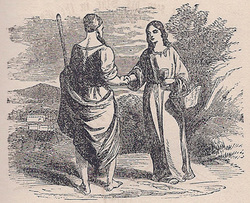
Electa, The Mother (II John:5)
She was a lady of high repute in the land of Judea, of noble family, wealthy and accomplished, who lived in the days of St. John the Evangelist, and was remarkable for her profuse benevolence to the poor.
Electa had been reared, as all her neighbors were, a heathen. The idols of Rome were the only gods she knew. Like Ruth, however, she had been preserved from the abominations of the system, and when by good fortune she was enabled to hear from inspired lips the story of Calvary and its Divine victim, her heart readily opened to the influences of the Holy Spirit. She became converted together with her husband and all her household. She even professed, before the World, her faith in the despised Nazarene, though well she knew that to do so was to expose herself to reproaches, to persecution, and haply to death.
Fourteen years, however, passed away before that great trial came upon her. These years became the happier as well as the better years of her life. She gave her great income to the relief of the poor. Her splendid mansion was made a house of abode to weary and persecuted pilgrims. The poorest of the flock, the tattered, and footsore beggar, coming up the great avenue to her door was met as the father met his prodigal son.
She ran out hastily to meet him, took him warmly by the hand, and welcomed him. She led him to the best apartment, refreshed him with the richest wine in a golden cup, fed, cheered, clothed her guest, nor suffered him to depart until he was strengthened for the journey. Through all the country her name was famous as "the beneficent and affectionate Electa." And all this time she was ripening for the better world, and - preparing for a fate which, although protracted, was inevitably to settle upon her.
The time of her martyrdom drew nigh. A great persecution began, and anyone who had confessed the name of Jesus was required to recant from his faith, or suffer the penalty of the law. Electa was visited by a band of soldiers, whose chief officer proposed the test of "casting a cross on the ground and putting her foot upon it," whereupon he would report her recantation. She refused, and the family were cast into a dungeon and kept there one year. Then the Roman Judge came and offered her another opportunity to recant, promising that if she would do so she should be protected. Again she refused, and this brought the drama to a speedy close. The whole family were scourged to the very verge of death. They were then drawn on a cart, by oxen, to the nearest hill, and crucified. She saw her husband perish. She saw each of her sons and daughters die on the cruel tree. She was then nailed there, and being about to pass, she prayed with her expiring breath: "Father, forgive them, for they know not what they do!"
She was a lady of high repute in the land of Judea, of noble family, wealthy and accomplished, who lived in the days of St. John the Evangelist, and was remarkable for her profuse benevolence to the poor.
Electa had been reared, as all her neighbors were, a heathen. The idols of Rome were the only gods she knew. Like Ruth, however, she had been preserved from the abominations of the system, and when by good fortune she was enabled to hear from inspired lips the story of Calvary and its Divine victim, her heart readily opened to the influences of the Holy Spirit. She became converted together with her husband and all her household. She even professed, before the World, her faith in the despised Nazarene, though well she knew that to do so was to expose herself to reproaches, to persecution, and haply to death.
Fourteen years, however, passed away before that great trial came upon her. These years became the happier as well as the better years of her life. She gave her great income to the relief of the poor. Her splendid mansion was made a house of abode to weary and persecuted pilgrims. The poorest of the flock, the tattered, and footsore beggar, coming up the great avenue to her door was met as the father met his prodigal son.
She ran out hastily to meet him, took him warmly by the hand, and welcomed him. She led him to the best apartment, refreshed him with the richest wine in a golden cup, fed, cheered, clothed her guest, nor suffered him to depart until he was strengthened for the journey. Through all the country her name was famous as "the beneficent and affectionate Electa." And all this time she was ripening for the better world, and - preparing for a fate which, although protracted, was inevitably to settle upon her.
The time of her martyrdom drew nigh. A great persecution began, and anyone who had confessed the name of Jesus was required to recant from his faith, or suffer the penalty of the law. Electa was visited by a band of soldiers, whose chief officer proposed the test of "casting a cross on the ground and putting her foot upon it," whereupon he would report her recantation. She refused, and the family were cast into a dungeon and kept there one year. Then the Roman Judge came and offered her another opportunity to recant, promising that if she would do so she should be protected. Again she refused, and this brought the drama to a speedy close. The whole family were scourged to the very verge of death. They were then drawn on a cart, by oxen, to the nearest hill, and crucified. She saw her husband perish. She saw each of her sons and daughters die on the cruel tree. She was then nailed there, and being about to pass, she prayed with her expiring breath: "Father, forgive them, for they know not what they do!"
Webmaster's Note:
I cannot take credit for any of the content on this page. The text is compiled from information on the website of Goldsboro Chapter No. 54, Wikipedia, and my century-old 1868 edition of the "Manual of the Order of the Eastern Star" edited by Robert Macoy. The illustrations are also from that 1868 edition.
I cannot take credit for any of the content on this page. The text is compiled from information on the website of Goldsboro Chapter No. 54, Wikipedia, and my century-old 1868 edition of the "Manual of the Order of the Eastern Star" edited by Robert Macoy. The illustrations are also from that 1868 edition.

